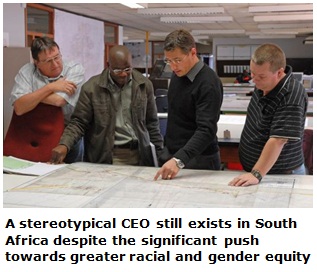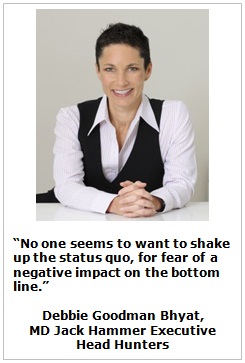 ReConnect Africa is a unique website and online magazine for the African professional in the Diaspora. Packed with
essential information about careers, business and jobs, ReConnect Africa keeps you connected to the best of Africa.
ReConnect Africa is a unique website and online magazine for the African professional in the Diaspora. Packed with
essential information about careers, business and jobs, ReConnect Africa keeps you connected to the best of Africa.



 A new study on top executives in South Africa shows that despite progress with racial and gender equity, the leadership landscape is still lacking in diversity
A new study on top executives in South Africa shows that despite progress with racial and gender equity, the leadership landscape is still lacking in diversity
Jack Hammer Executive Headhunters recently concluded in-depth research into the leadership of corporate South Africa. The aim of the study was to drill down to the detail of some of the “common knowledge” about leadership in corporate South Africa.
While some of the findings revealed a stark lack of diversity at the top echelons of business, other results debunked some myths that exist; for example, that there are very few foreigners in top corporate leadership.
The research focused on the Top 40 listed businesses in South Africa as well as a broader set of 40 corporate businesses including multinationals. The focus areas included, among others, Age, Race, Gender, Education, Family situation and Sporting involvement. The research forms what will be an official benchmark against which leadership (and transformation in these ranks) can now be tracked year on year.
Senior executives are still being cut from the same cookie cutter with 95% of the top positions filled by white males, nearly 60% of whom are over 50, and close to 70% of whom have degrees in finance.
This has been revealed in a new study on top executives in South Africa, which shows a stereotypical CEO still exists in South Africa despite the significant push towards greater racial and gender equity.
The Jack Hammer Executive Report which was created in order to debunk myths around executive appointments and create an informed view of South Africa’s business leadership landscape, provides interesting insights into the C-suite, and is intended to become an annual measure of the changing face of top executives in the country.
The study pulled together available facts and statistics from 80 top companies in South Africa. They comprise the country’s top 40 JSE listed companies as measured by market capitalisation as well as 40 leading corporate businesses from the broader industry, dubbed the ‘Broad 40’.
Debbie Goodman Bhyat, the founder and Managing Director of Jack Hammer Executive Head Hunters - rated by the Business Day as one of South Africa’s leading executive search firms - says that the issue is not that business is loath to transform, but rather about companies’ perception of the risks of appointing non-traditional CEO’s who don’t fit the previously cast mould and might be seen as mavericks or outliers.
“It is no secret that there is some unhappiness about the slow pace of transformation and while good intentions abound, boards remain very risk averse, particularly in tough economic times,” she says. “Neither the decision makers, nor shareholders they are accountable to, like change. No one seems to want to shake up the status quo, for fear of a negative impact on the bottom line. Instead corporate employment decisions revert to default positions rather than making bold new moves to change those at the helm in top corporations.
 “The general feeling is that we have progressed a great deal since the introduction of broad black economic empowerment policies. However, the snapshot our researchers have gleaned shows little progress has been made at the top echelons of South African business.
“The general feeling is that we have progressed a great deal since the introduction of broad black economic empowerment policies. However, the snapshot our researchers have gleaned shows little progress has been made at the top echelons of South African business.
“Making the top appointment is one of the most intricate decisions especially in an age where accountability and transformation are crucial. The right information and insights are imperative as it takes things out of the realm of gut feel and guesswork”, she says.
The figures show that 15% of the Top 40 CEO’s are black, 5% are female and the vast majority have a degree in finance and at least one post graduate qualification. By expanding the view to the Broad 40, the picture is similar with only 13% black and 10% female.
Interestingly not many foreigners head the top 40 companies in SA – one of the corporate myths that can now be debunked. In the Top 40, 85% of the CEO’s are South African and among the Broad 40, 77% are South African citizens.
Unsurprisingly, every top executive has at least one university degree and the MBA remains the most popular postgraduate qualification among this group, with 25% of the top 40 CEO’s, and 20% of the broad 40 CEO’s having earned these. However, the CEO’s in the Top 40 have a significantly greater number of masters and doctorate degrees – 28%, versus only 11% in the broad 40.
Aside from the vast majority holding degrees in finance, 17,5% hold Mining and Engineering degrees, and 5% have a degree in Geology 5% . Only 1% has made it to the corner office with a Marketing degree. The research shows among the top 40 group, not one of the CEO’s are younger than 40, 22% of them are under 50 and 20% are over 60 years old.
“Among the larger corporations, significant experience (and by implication, age) is non-negotiable due to the levels of complexity and scale inherent in running such organisations. In the broad 40, age is less of a definer, with 62% of the CEO’s being below 50 years old, only 25% in their 50’s and 7% in their sixties.
“Among the Top 40, younger, more energetic and innovative executives may be overlooked in favour of a steady, older hand. There seems to be a reluctance to take a chance on a leader with ‘potential’. Instead, boards want tried and tested performers, and are more willing to forfeit supercharged outperformance, if it means that they can minimise potential downside risk,” says Goodman-Bhyat.
“Not surprisingly, 55% of these top executives have held their positions for longer than 5 years. Among the top 40 companies, change is lot slower. These companies are big enough to accommodate several moves by a leader before reaching the CEO role and once there they tend to hold the position for at least a 5 year period, and sometime longer.
“There seems to be shorter tenure in the broad 40 companies with nearly 50% of the incumbents having held their position for less than 3 years.”
The majority of executives from both groupings are married and have children and regularly play sport. Interestingly the top 40 executives overwhelmingly favour organised team sports such as cricket and tennis while within the broad 40, individual competitive sports are favoured such as cycling, running and golf.
“It is interesting that 75% of all the top leaders participate in sport, many of them at very competitive levels including marathons. Many proudly list their participation in endurance sport events such as Iron Man contests among their achievements.”
Top image: Graeme Williams, mediaclubsouthafrica.com
